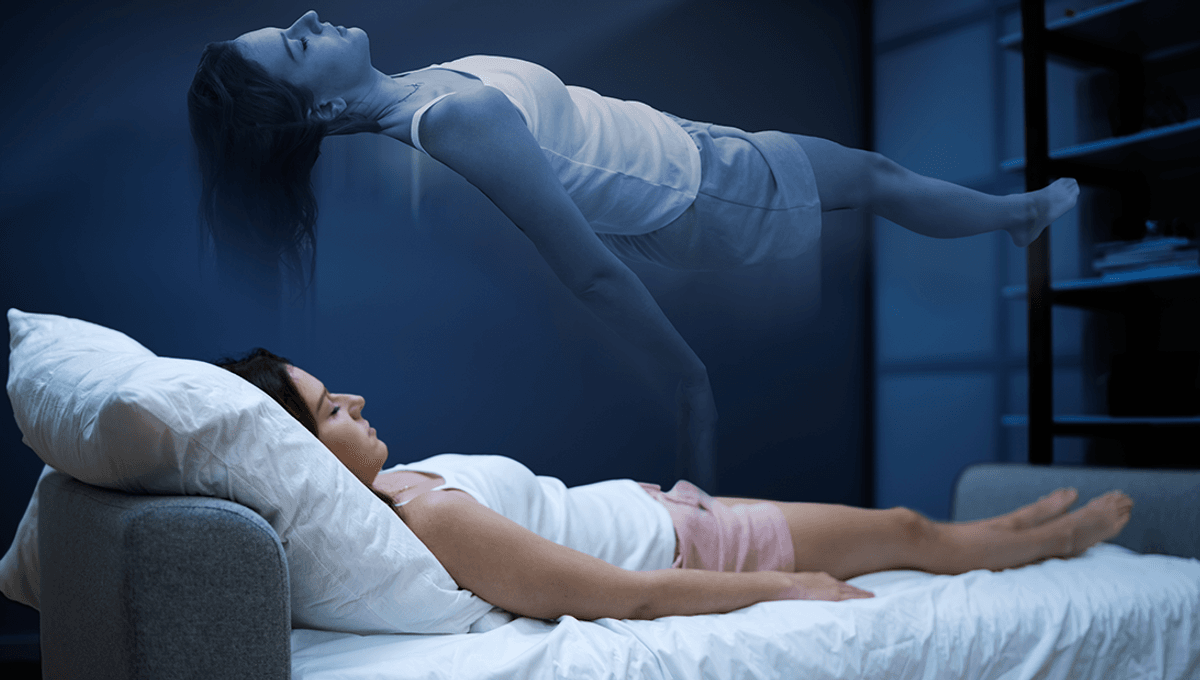
A new study has identified common factors in people who have had out-of-body experiences (OBEs), the odd phenomenon where people describe experiencing the world as if from a location outside their own bodies.
A surprising number of people have had OBEs, with some surveys finding that they have affected between 10 and 20 percent of the population. Their experience and effect can vary from person to person.
“OBEs manifest in diverse ways, with each individual describing unique sensations and circumstances surrounding the experience. The triggering factors are diverse and, in many cases, completely opposite to one another,” a paper on the topic explains.
“These experiences can arise in moments of deep tranquility, such as during meditation or relaxation, or, conversely, in situations of extreme stress, when the individual is in physical danger or undergoing psychological trauma. Once the experience is triggered, the sensation of being outside the body can be accompanied by a wide range of emotions. Some individuals describe an absolute sense of peace, while in other cases, the experience can be marked by fear, especially due to the thought: ‘I won’t be able to return to my body’.”
After these often traumatic experiences, people have described feeling as if they were outside of their body, and sometimes looking down on it.
“I see myself as if I was from an airplane and looking down at a distance of about 5 feet [1.5 meters]. I feel split and I see myself down. I have my body down, I’m not in my body, I’m out of my body,” one person described, per a case report. “My mind sees my body, I see the shape of my body. The part of mine that is over…it seems strange to me looks like an angel, an entity. I see the body there but I’m like air.”
Researchers have focused on what brings about these odd experiences in the past, with suggestions that they could be caused by problems in the inner ear. Other studies have induced OBEs by stimulating the right angular gyrus in the brain, the area responsible for integrating visual information and feedback from limbs about their position, essentially creating in the mind a representation of the body. By using electrodes to stimulate the area during an operation, researchers in Switzerland triggered the phenomenon in one patient undergoing brain surgery. A subsequent patient, hoping to be cured of tinnitus in 2007, experienced several OBEs when the same area was stimulated.
In the new study, the team led by Dr Marina Weiler, neuroscientist at the University of Virginia’s Division of Perceptual Studies, investigated common factors shared by people who have experienced OBEs. They recruited 545 adults from diverse backgrounds, asking them whether they had ever had an OBE, as well as a number of other questions about their health, mental health, and life and psychiatric history.
Among those who had experienced OBEs, 80 percent reported between one and four instances of it, with 20 percent reporting five or higher. Seventy-four percent were described as taking place spontaneously, while 9 percent said that they had followed the use of psychoactive compounds, 8.2 percent following meditation or visualization, and 0.7 percent reporting it after hypnosis.
The team found that there were common factors, with those who had experienced OBEs “showing higher common mental disorders”, including depression and anxiety. The OBE group was also more prone to dissociation symptoms, scoring higher on the Dissociative Experience Scale Taxon (DES-T).
In this area, the differences were striking, with 40 percent of the OBE group gaining scores over 20, suggesting a moderate level of dissociative experiences, compared to 14 percent of the non-OBE group. As well as this, the team found that those who had experienced higher levels of trauma in childhood were more likely to experience OBEs.
While the study suggests that there is a link between common mental health issues and OBEs, the team suggest that OBEs themselves may actually be a subconscious phenomenon offering “a temporary escape from distressing realities or enabling a reframing of personal experiences”.
“Many people believe that having OBEs means there’s something wrong with them, so they often keep it to themselves out of fear of being judged or seen as mentally ill. Unfortunately, many mental health professionals still view these experiences in the same way,” Weiler said in a statement.
“In this work, we found that individuals who have had OBEs tend to report poorer mental health compared to those who have not. However, our findings also suggest that OBEs may function as a coping mechanism in response to past trauma, rather than serving as a cause of mental illness. We encourage mental health practitioners to reconsider the way they interpret these experiences and to approach them with greater openness and sensitivity.”
Though an interesting link, more study is needed. The team suggests that further investigations should focus on the circumstances surrounding the OBE.
“The context in which an OBE occurs, whether spontaneous, intentionally induced through techniques such as meditation or sensory deprivation, or facilitated by psychedelic substances, likely introduces significant variance in the underlying neural mechanisms and associated psychological sequelae,” they conclude. “In summary, our findings suggest the need for more nuanced studies of OBEs.”
The study is published in Personality and Individual Differences.
Source Link: Scientists Find Common Factors In People Who Have "Out-Of-Body" Experiences